>Module 1 Explorations and exchanges Unit 1 Great explorations课件(共28张PPT)
文档属性
| 名称 | >Module 1 Explorations and exchanges Unit 1 Great explorations课件(共28张PPT) | 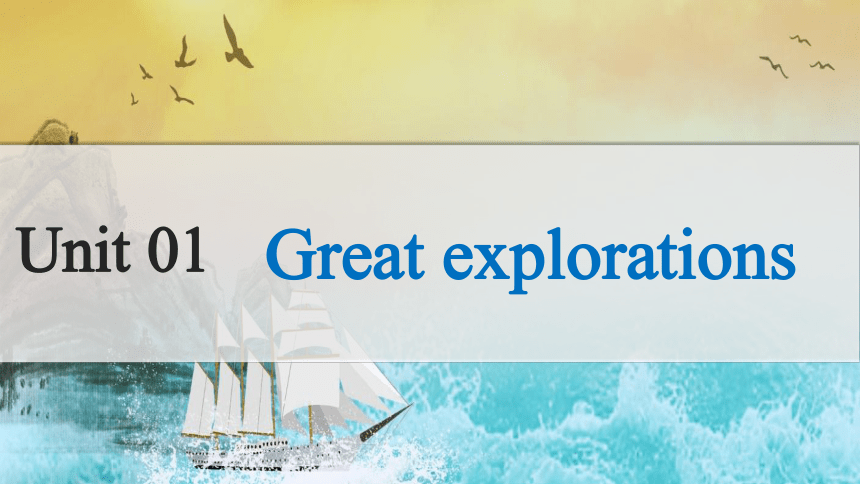 | |
| 格式 | pptx | ||
| 文件大小 | 2.1MB | ||
| 资源类型 | 教案 | ||
| 版本资源 | 牛津深圳版 | ||
| 科目 | 英语 | ||
| 更新时间 | 2022-02-24 20:05:40 | ||
图片预览


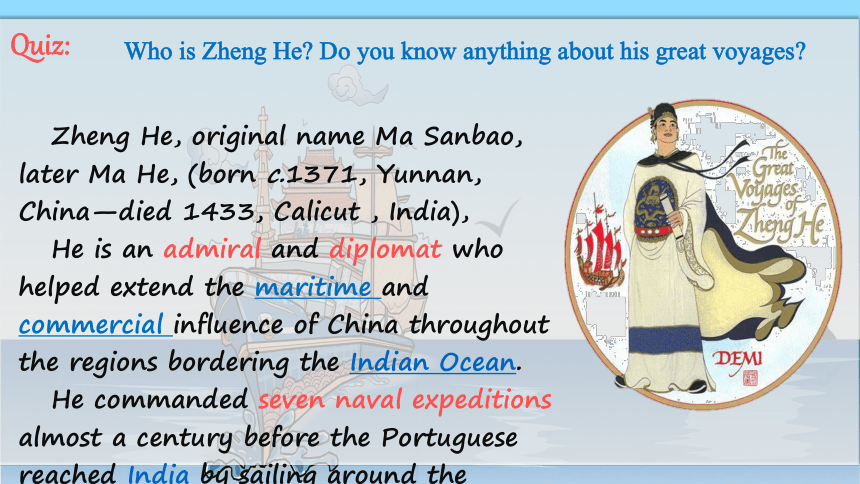

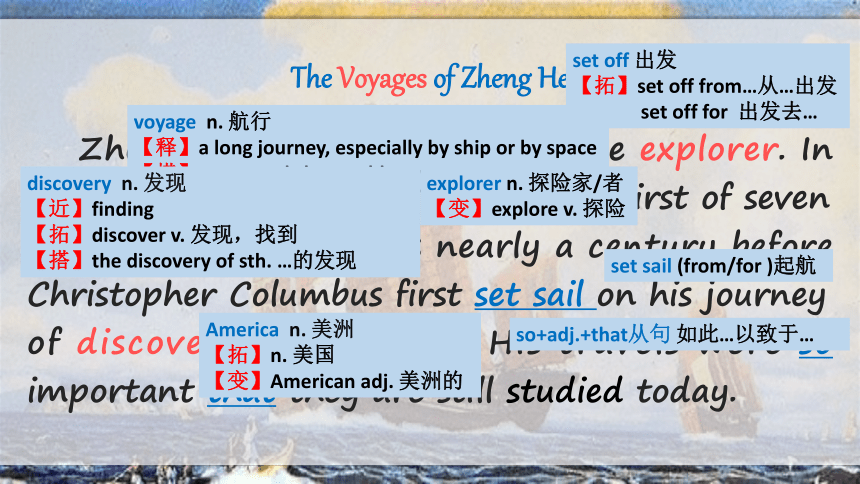
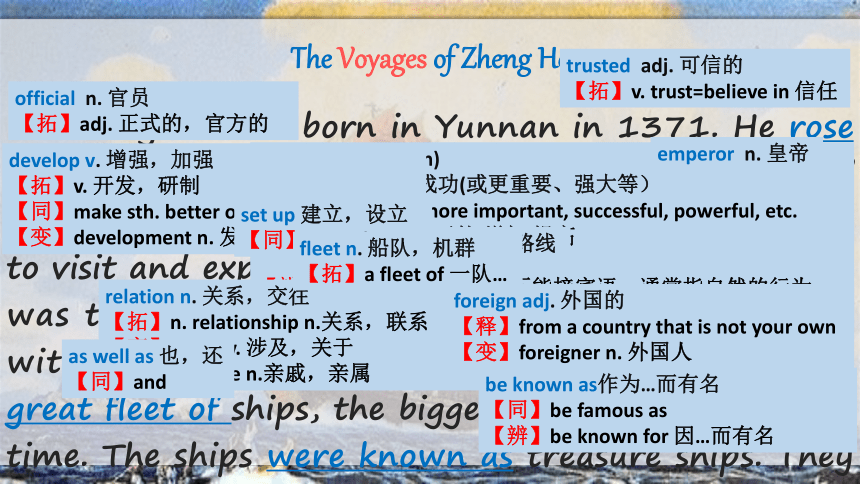
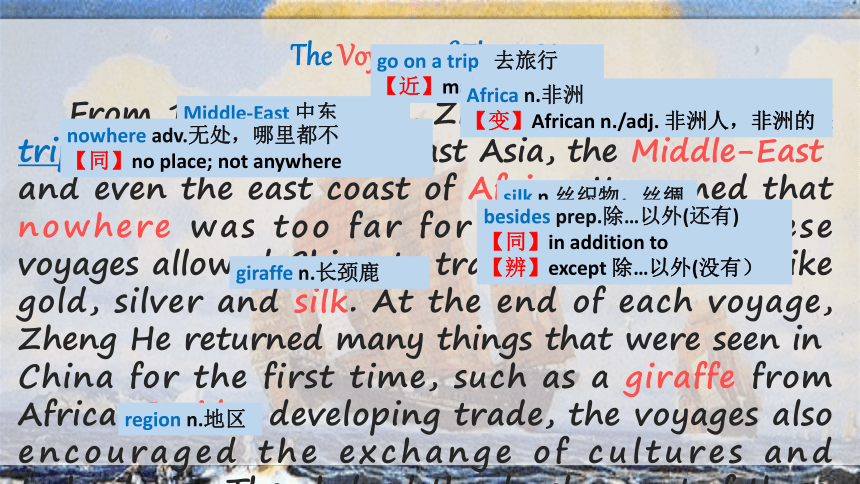


文档简介
(共28张PPT)
Great explorations
Unit 01
Lead in
Quiz:
Who is Zheng He Do you know anything about his great voyages
Zheng He, original name Ma Sanbao, later Ma He, (born c.1371, Yunnan, China—died 1433, Calicut , India),
He is an admiral and diplomat who helped extend the maritime and commercial influence of China throughout the regions bordering the Indian Ocean.
He commanded seven naval expeditions almost a century before the Portuguese reached India by sailing around the southern tip of Africa.
Passage
The Voyages of Zheng He
Zheng He was a famous Chinese explorer. In 1405, he set off from China on the first of seven great voyages. This was nearly a century before Christopher Columbus first set sail on his journey of discovery to America. His travels were so important that they are still studied today.
voyage n. 航行
【释】a long journey, especially by ship or by space
【搭】an around-the-world voyage
explorer n. 探险家/者
【变】explore v. 探险
set off 出发
【拓】set off from…从…出发
set off for 出发去…
set sail (from/for )起航
discovery n. 发现
【近】finding
【拓】discover v. 发现,找到
【搭】the discovery of sth. …的发现
America n. 美洲
【拓】n. 美国
【变】American adj. 美洲的
so+adj.+that从句 如此…以致于…
The Voyages of Zheng He
Zheng He was born in Yunnan in 1371. He rose to become a trusted official of the Yongle Emperor of the Ming Dynasty. The emperor ordered Zheng He to visit and explore the lands outside China. His task was to develop relations and set up trade routes with foreign countries. In a few years, he built a great fleet of ships, the biggest in the world at that time. The ships were known as treasure ships. They were big enough to carry 25,000 people as well as very large quantities of goods.
rise (rise-rose-risen)
v. 变得更加成功(或更重要、强大等)
【释】to become more important, successful, powerful, etc.
【拓】v. (数量或水平的)增加,提高
v. ( 太阳、月亮)升起
【辨】rise 是不及物动词,不能接宾语,通常指自然的行为;
raise 是及物动词,通常带宾语,通常是人为的行为。
trusted adj. 可信的
【拓】v. trust=believe in 信任
official n. 官员
【拓】adj. 正式的,官方的
emperor n. 皇帝
develop v. 增强,加强
【拓】v. 开发,研制
【同】make sth. better or stronger
【变】development n. 发展,壮大=growth
relation n. 关系,交往
【拓】n. relationship n.关系,联系
【变】relate v. 涉及,关于
relative n.亲戚,亲属
set up 建立,设立
【同】found/start;
route n. 路线
foreign adj. 外国的
【释】from a country that is not your own【变】foreigner n. 外国人
fleet n. 船队,机群
【拓】a fleet of 一队…
be known as作为…而有名
【同】be famous as
【辨】be known for 因…而有名
as well as 也,还
【同】and
The Voyages of Zheng He
From 1405 to 1433, Zheng He went on seven trips and visited South-East Asia, the Middle-East and even the east coast of Africa. It seemed that nowhere was too far for him to visit. These voyages allowed China to trade valuable goods like gold, silver and silk. At the end of each voyage, Zheng He returned many things that were seen in China for the first time, such as a giraffe from Africa. Besides developing trade, the voyages also encouraged the exchange of cultures and technologies. They helped the development of those countries and regions.
go on a trip 去旅行
【近】make a journey
Middle-East 中东
Africa n.非洲
【变】African n./adj. 非洲人,非洲的
nowhere adv.无处,哪里都不
【同】no place; not anywhere
silk n.丝织物,丝绸
giraffe n.长颈鹿
besides prep.除…以外(还有) 【同】in addition to
【辨】except 除…以外(没有)
region n.地区
The Voyages of Zheng He
Zheng He died in 1433 during his last voyage. However, his voyages were such a huge achievement that people still remember him as a pioneer in opening up cultural contacts between different peoples around the world.
such+a/an+adj.+n.+that从句
如此…以致于…
open up 开辟
Vocabulary
repetition
n. [C] 重复
【释】 doing or saying the same thing many times
【变】 repeat v.重复
【例】 We don’t want to see a _________of last year’s tragic events.
I’m sorry, I didn’t catch you. Could you ________it
repetition
repeat
continent
n. 大陆
pioneer
n. 先锋,先驱
【例】 China lies in the east of ________(Asia) Continent.
【拓】 seven continent 七大洲
【释】 a person who is the first to study and develop a particular area
【例】He was a pioneer in revolution and also one of my hero.
Asian
people
n. 民族,种族
【例】 When I was travelling, I found that the native
_______ (people ) of Central and Southern America were so friendly.
wealth
n. 财富
【变】 wealthy adj. 富有的
【同】 a large amount of money or possessions
【例】A happy life has less to do with how much _________(wealth)you own.
peoples
wealth
spread
v. 传播
【拓】 spread-spread-spread
【变】 v. 张开
【例】This kind of flu___________( spread) quickly and widely.
lead to
导致
【同】 make sth. happen; cause; result in
【变】 lead sb. to +地点 带领某人去…
【变】 lead n.铅
【例】His careless _____ (lead) to the traffic accident.
spreads
lead
compare …with…
把…与…对比
【辨】 compare…to… 把…比作 【不同类事物】
【变】 comparison n. 对比
【例】________(compare) with other students, he felt disappointed with himself.
Compared
用括号中所给的单词或短语填空。
1. Let’s have a rest. _____________ (wealthy)is nothing without health.
2. World Earth Day ________ (set) up in 1970 to tell us to protect our planet.
3. Recently, flu viruses _____________ (spread) rapidly, and many students have got the flu.
4. Cao Yuan made some new _____________ (develop) in science.
5. China has _____________ (develop) rapidly in recent years.
6. _____________ (compare) with his English, mine is better.
7. Nothing but hard work can _____________ _____________ (导致) success.
8. As a result of the greenhouse effect, the Earth’s temperature is _____________(rise) .
9. ________ (spread )Chinese culture, many college students go to foreign countries every year.
10. Lao She is _____________ _____________ (作为…而有名)a great writer.
Wealth
was set
spread
development
developed
compared
lead to
rising
To spread
known as
Grammar
Adverbial clauses of result
-结果状语从句
定义
用以补充说明主语中谓语动词发生的结果的状语从句,
常用 “so…that…” “such…that…”引导,位于主句之后。
He speaks so fast that no one hears him clearly.
Tom is such an honest person that we all trust him.
如此……以致……
Adverbial clauses of result
-结果状语从句
A
B
so…that 从句
such…that 从句
构成
He speaks so fast that no one hears him clearly.
Tom is such an honest person that we all trust him.
such 是形容词,修饰名词;
so 是副词,修饰形容词或副词。
adv.
名词短语
1.so+adj.+that从句
She was tired she fell asleep quickly.
She fell asleep quickly.
She was tired.
so
that
Adverbial clauses of result
-结果状语从句
2.so+adv.+that 从句
They played badly they lost the game.
They lost the game.
They played badly.
so
that
Adverbial clauses of result
-结果状语从句
3. so +adj.+a/an+可数名词单数+that从句
She’s always praised by teachers.
She was a hard-working student.
She was hard-working she’s always praised by teachers.
so
a student that
4. so +many/much/few/little +n.+that从句
He saved much money he could pay for the expensive car.
so
that
The little girl ate little food she felt hungry quickly.
so
that
Adverbial clauses of result
-结果状语从句
5. such +a/an+ adj.+可数名词单数+that从句
6. such +adj.+名词.+that从句
This is important meeting you mustn’t miss it .
Zhou is funny man many persons like his lively shows.
such an
that
such a
that
名词复数或不可数名词
The book was written in easy English the kids could understand it .
such
that
She took interesting parties she couldn’t forget them .
such
that
Adverbial clauses of result
-结果状语从句
注意
为了强调形容词、副词或名词,so/such…that…引导的结果状语从句,可把so/such置于句首,主语用倒装语序。
He was so nervous that he didn’t pass the interview.
He was such an excellent manager that he made a lot of profits for his company.
So nervous was he that he didn’t pass the interview.
Such an excellent manager was he that he made a lot of profits for his company.
Adverbial clauses of result
-结果状语从句
太…而不能
足够…去
不足够…去
表结果
too…to…
enough…to.
not enough…to.
后接动词
Adverbial clauses of result
-句型转换
2. 当主句和从句的主语不一致,that从句是否定时,可用too…for sb. to do 来转换
The girl is so young that she can’t look after herself.
The table is so heavy that she can’t move it.
The girl is too young to look after herself.
The table is too heavy for her to move it.
1. 当主句和从句的主语一致,that从句是否定时,可用too…to来转换
Adverbial clauses of result
-句型转换
3. 当主句和从句的主语一致,that从句是肯定时,可用enough to来转换
4. 当主句和从句的主语不一致,that从句是肯定时,可用enough for sb. to do 来转换
The man is so tall that he can reach the roof.
The problem is so easy that he can work it out.
The man is tall enough to reach the roof.
The problem is easy enough for him to work out.
Exercise
( )1. Lily told me ________ interesting story ________ I laughed loudly.
A. such a; that B. such; that C. so a; that D. so; that
( )2. She was ________ tired ________ she didn’t even have energy to take a shower.
A. too; that B. such; that C. so; that D. as; that
( )3. After studying for three hours, Tina was ________ exhausted ________ go on.
A. as; as B. too; to C. so; that D. not; enough
( )4. Sam didn’t run ________ to catch up with the other competitors.
A. enough fast B. so fast C. fast enough D. such fast
( )5. There was ________ much food ________ the refrigerator was soon full.
A. such; that B. so; that C. such a; that D. so; to
Thank you!
Great explorations
Unit 01
Lead in
Quiz:
Who is Zheng He Do you know anything about his great voyages
Zheng He, original name Ma Sanbao, later Ma He, (born c.1371, Yunnan, China—died 1433, Calicut , India),
He is an admiral and diplomat who helped extend the maritime and commercial influence of China throughout the regions bordering the Indian Ocean.
He commanded seven naval expeditions almost a century before the Portuguese reached India by sailing around the southern tip of Africa.
Passage
The Voyages of Zheng He
Zheng He was a famous Chinese explorer. In 1405, he set off from China on the first of seven great voyages. This was nearly a century before Christopher Columbus first set sail on his journey of discovery to America. His travels were so important that they are still studied today.
voyage n. 航行
【释】a long journey, especially by ship or by space
【搭】an around-the-world voyage
explorer n. 探险家/者
【变】explore v. 探险
set off 出发
【拓】set off from…从…出发
set off for 出发去…
set sail (from/for )起航
discovery n. 发现
【近】finding
【拓】discover v. 发现,找到
【搭】the discovery of sth. …的发现
America n. 美洲
【拓】n. 美国
【变】American adj. 美洲的
so+adj.+that从句 如此…以致于…
The Voyages of Zheng He
Zheng He was born in Yunnan in 1371. He rose to become a trusted official of the Yongle Emperor of the Ming Dynasty. The emperor ordered Zheng He to visit and explore the lands outside China. His task was to develop relations and set up trade routes with foreign countries. In a few years, he built a great fleet of ships, the biggest in the world at that time. The ships were known as treasure ships. They were big enough to carry 25,000 people as well as very large quantities of goods.
rise (rise-rose-risen)
v. 变得更加成功(或更重要、强大等)
【释】to become more important, successful, powerful, etc.
【拓】v. (数量或水平的)增加,提高
v. ( 太阳、月亮)升起
【辨】rise 是不及物动词,不能接宾语,通常指自然的行为;
raise 是及物动词,通常带宾语,通常是人为的行为。
trusted adj. 可信的
【拓】v. trust=believe in 信任
official n. 官员
【拓】adj. 正式的,官方的
emperor n. 皇帝
develop v. 增强,加强
【拓】v. 开发,研制
【同】make sth. better or stronger
【变】development n. 发展,壮大=growth
relation n. 关系,交往
【拓】n. relationship n.关系,联系
【变】relate v. 涉及,关于
relative n.亲戚,亲属
set up 建立,设立
【同】found/start;
route n. 路线
foreign adj. 外国的
【释】from a country that is not your own【变】foreigner n. 外国人
fleet n. 船队,机群
【拓】a fleet of 一队…
be known as作为…而有名
【同】be famous as
【辨】be known for 因…而有名
as well as 也,还
【同】and
The Voyages of Zheng He
From 1405 to 1433, Zheng He went on seven trips and visited South-East Asia, the Middle-East and even the east coast of Africa. It seemed that nowhere was too far for him to visit. These voyages allowed China to trade valuable goods like gold, silver and silk. At the end of each voyage, Zheng He returned many things that were seen in China for the first time, such as a giraffe from Africa. Besides developing trade, the voyages also encouraged the exchange of cultures and technologies. They helped the development of those countries and regions.
go on a trip 去旅行
【近】make a journey
Middle-East 中东
Africa n.非洲
【变】African n./adj. 非洲人,非洲的
nowhere adv.无处,哪里都不
【同】no place; not anywhere
silk n.丝织物,丝绸
giraffe n.长颈鹿
besides prep.除…以外(还有) 【同】in addition to
【辨】except 除…以外(没有)
region n.地区
The Voyages of Zheng He
Zheng He died in 1433 during his last voyage. However, his voyages were such a huge achievement that people still remember him as a pioneer in opening up cultural contacts between different peoples around the world.
such+a/an+adj.+n.+that从句
如此…以致于…
open up 开辟
Vocabulary
repetition
n. [C] 重复
【释】 doing or saying the same thing many times
【变】 repeat v.重复
【例】 We don’t want to see a _________of last year’s tragic events.
I’m sorry, I didn’t catch you. Could you ________it
repetition
repeat
continent
n. 大陆
pioneer
n. 先锋,先驱
【例】 China lies in the east of ________(Asia) Continent.
【拓】 seven continent 七大洲
【释】 a person who is the first to study and develop a particular area
【例】He was a pioneer in revolution and also one of my hero.
Asian
people
n. 民族,种族
【例】 When I was travelling, I found that the native
_______ (people ) of Central and Southern America were so friendly.
wealth
n. 财富
【变】 wealthy adj. 富有的
【同】 a large amount of money or possessions
【例】A happy life has less to do with how much _________(wealth)you own.
peoples
wealth
spread
v. 传播
【拓】 spread-spread-spread
【变】 v. 张开
【例】This kind of flu___________( spread) quickly and widely.
lead to
导致
【同】 make sth. happen; cause; result in
【变】 lead sb. to +地点 带领某人去…
【变】 lead n.铅
【例】His careless _____ (lead) to the traffic accident.
spreads
lead
compare …with…
把…与…对比
【辨】 compare…to… 把…比作 【不同类事物】
【变】 comparison n. 对比
【例】________(compare) with other students, he felt disappointed with himself.
Compared
用括号中所给的单词或短语填空。
1. Let’s have a rest. _____________ (wealthy)is nothing without health.
2. World Earth Day ________ (set) up in 1970 to tell us to protect our planet.
3. Recently, flu viruses _____________ (spread) rapidly, and many students have got the flu.
4. Cao Yuan made some new _____________ (develop) in science.
5. China has _____________ (develop) rapidly in recent years.
6. _____________ (compare) with his English, mine is better.
7. Nothing but hard work can _____________ _____________ (导致) success.
8. As a result of the greenhouse effect, the Earth’s temperature is _____________(rise) .
9. ________ (spread )Chinese culture, many college students go to foreign countries every year.
10. Lao She is _____________ _____________ (作为…而有名)a great writer.
Wealth
was set
spread
development
developed
compared
lead to
rising
To spread
known as
Grammar
Adverbial clauses of result
-结果状语从句
定义
用以补充说明主语中谓语动词发生的结果的状语从句,
常用 “so…that…” “such…that…”引导,位于主句之后。
He speaks so fast that no one hears him clearly.
Tom is such an honest person that we all trust him.
如此……以致……
Adverbial clauses of result
-结果状语从句
A
B
so…that 从句
such…that 从句
构成
He speaks so fast that no one hears him clearly.
Tom is such an honest person that we all trust him.
such 是形容词,修饰名词;
so 是副词,修饰形容词或副词。
adv.
名词短语
1.so+adj.+that从句
She was tired she fell asleep quickly.
She fell asleep quickly.
She was tired.
so
that
Adverbial clauses of result
-结果状语从句
2.so+adv.+that 从句
They played badly they lost the game.
They lost the game.
They played badly.
so
that
Adverbial clauses of result
-结果状语从句
3. so +adj.+a/an+可数名词单数+that从句
She’s always praised by teachers.
She was a hard-working student.
She was hard-working she’s always praised by teachers.
so
a student that
4. so +many/much/few/little +n.+that从句
He saved much money he could pay for the expensive car.
so
that
The little girl ate little food she felt hungry quickly.
so
that
Adverbial clauses of result
-结果状语从句
5. such +a/an+ adj.+可数名词单数+that从句
6. such +adj.+名词.+that从句
This is important meeting you mustn’t miss it .
Zhou is funny man many persons like his lively shows.
such an
that
such a
that
名词复数或不可数名词
The book was written in easy English the kids could understand it .
such
that
She took interesting parties she couldn’t forget them .
such
that
Adverbial clauses of result
-结果状语从句
注意
为了强调形容词、副词或名词,so/such…that…引导的结果状语从句,可把so/such置于句首,主语用倒装语序。
He was so nervous that he didn’t pass the interview.
He was such an excellent manager that he made a lot of profits for his company.
So nervous was he that he didn’t pass the interview.
Such an excellent manager was he that he made a lot of profits for his company.
Adverbial clauses of result
-结果状语从句
太…而不能
足够…去
不足够…去
表结果
too…to…
enough…to.
not enough…to.
后接动词
Adverbial clauses of result
-句型转换
2. 当主句和从句的主语不一致,that从句是否定时,可用too…for sb. to do 来转换
The girl is so young that she can’t look after herself.
The table is so heavy that she can’t move it.
The girl is too young to look after herself.
The table is too heavy for her to move it.
1. 当主句和从句的主语一致,that从句是否定时,可用too…to来转换
Adverbial clauses of result
-句型转换
3. 当主句和从句的主语一致,that从句是肯定时,可用enough to来转换
4. 当主句和从句的主语不一致,that从句是肯定时,可用enough for sb. to do 来转换
The man is so tall that he can reach the roof.
The problem is so easy that he can work it out.
The man is tall enough to reach the roof.
The problem is easy enough for him to work out.
Exercise
( )1. Lily told me ________ interesting story ________ I laughed loudly.
A. such a; that B. such; that C. so a; that D. so; that
( )2. She was ________ tired ________ she didn’t even have energy to take a shower.
A. too; that B. such; that C. so; that D. as; that
( )3. After studying for three hours, Tina was ________ exhausted ________ go on.
A. as; as B. too; to C. so; that D. not; enough
( )4. Sam didn’t run ________ to catch up with the other competitors.
A. enough fast B. so fast C. fast enough D. such fast
( )5. There was ________ much food ________ the refrigerator was soon full.
A. such; that B. so; that C. such a; that D. so; to
Thank you!
